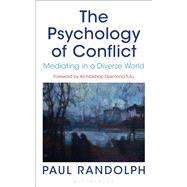The Psychology of Conflict Mediating in a Diverse World
, by Randolph, Paul- ISBN: 9781472922977 | 1472922972
- Cover: Paperback
- Copyright: 4/21/2016
In The Psychology of Conflict, Paul Randolph, a barrister and leading lecturer on mediation - the practice of conflict resolution in which an independent person acts as a go-between between two opposing parties - examines the application of existential philosophy to the psychology of mediation. Such an approach can help mediators to further understand the human behavior experienced and demonstrated by parties involved in conflict resolution, ensuring better outcomes for all involved.
Through outlining the shared existential 'givens' of Existential Psychology: Emotions, Time and Temporality, Uncertainty and Self Esteem, Randolph shows how conflict resolvers – mediators, diplomats, HR managers, complaint handlers, politicians – and their clients are affected by a vast array of different factors.
For example, parties involved in a mediation session can be governed by anger (47% of senior lawyers admitted to leading protracted litigation out of personal animosity towards their opposite number), questions of self-esteem, vindication, revenge, the need to be heard and the desire to be recompensed financially and emotionally.
Drawing on the existential philosophies of Kierkegaard, Heidegger, Husserl, Merleau-Ponty and Sartre, The Psychology of Conflict is a practical guide to assist mediators and anyone interested in conflict resolution to further understand the psychological processes behind what goes on before, during and after a mediation session. Further still, these ideas can be applied to an understanding of human behavior in conflicts more generally, in politics, peace negotiations, divorce and notably the commercial sector, where mediation is already widely used.







